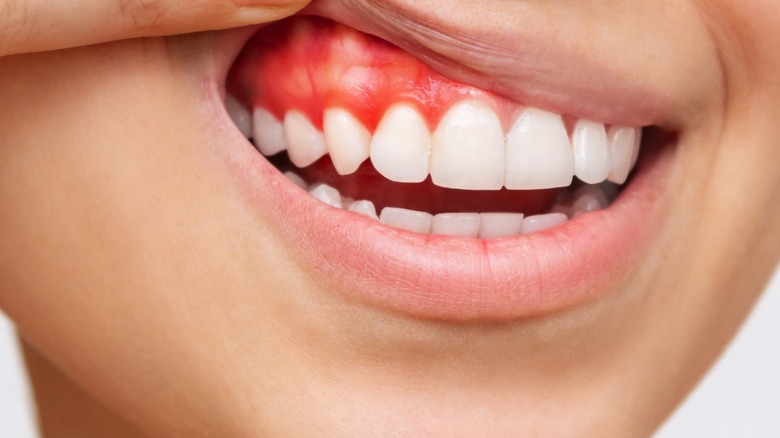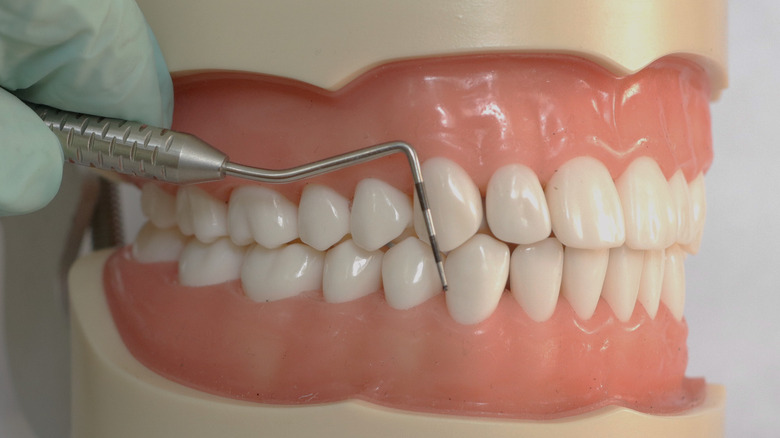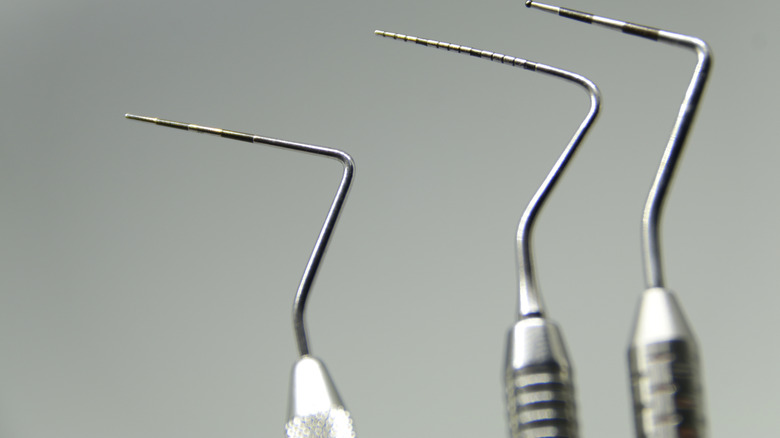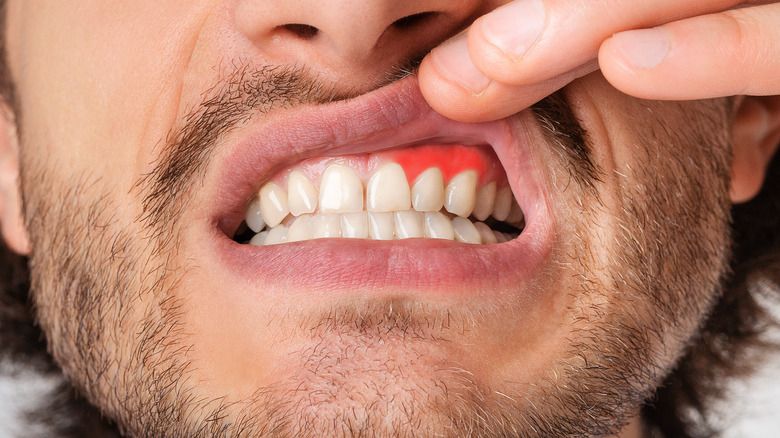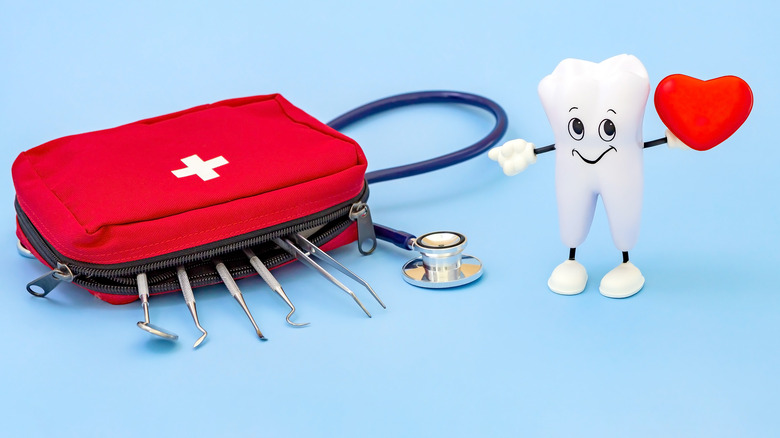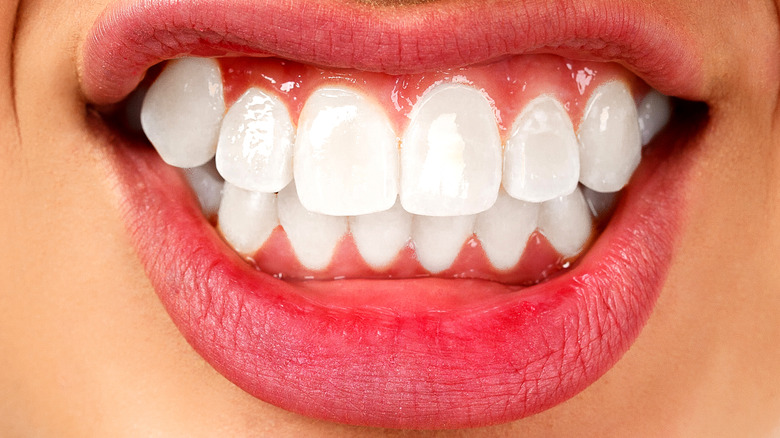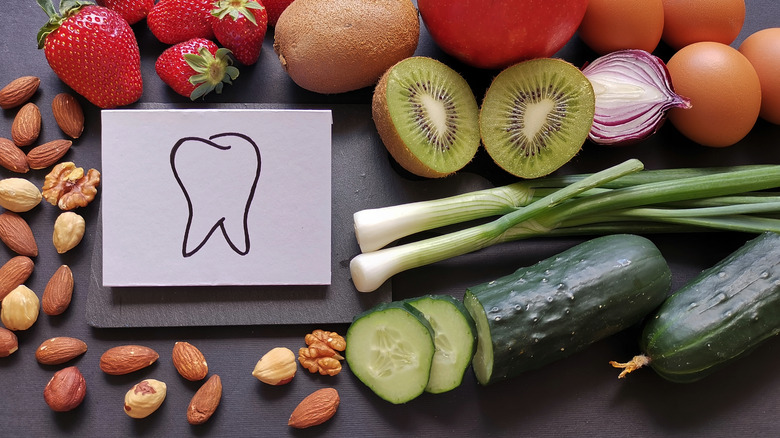Everything You Need To Know About Your Gums
While your eyes are the window to your soul, your mouth, in particular your gums, are a window to your health. The pink tissue that you thought only held your teeth in place also lets your dentist know how you feel and what's going on in your body. As the National Library of Medicine explains, the gums, also referred to as gingiva, are soft tissue designed to help keep bacteria out and diseases from occurring.
Poor oral hygiene leads to plaque build-up on your gums and teeth. Formed when bacteria mingle with the sugar you consume and capable of releasing harmful acids, plaque is odorless and colorless and can quickly build up without much notice (via Cleveland Clinic). However, if not removed in a timely manner, this sticky film causes a host of issues in the mouth. If left untreated, these problems can affect different parts of your body. In addition, some untreated medical conditions and some common medications can affect your gums and oral health.
Your gums tell your dentist a lot
When you smile in the mirror or for pictures, do you look at your mouth? Look past your teeth and see if your gums are pink in color. Professional Dental Care, a dental office based in California, explains that while your overall skin tone determines the particular shade of pink, your gums should match the other pink surfaces in your mouth. Now feel your gums. While only your dentist can tell how healthy your gums truly are, Professional Dental Care says that firmness is a sign of healthiness.
Your gums might be screaming for a dentist without you realizing it. The signs from your gums that your mouth needs help start off subtle, and MedicineNet outlines the symptoms. You may notice that you need an extra breath mint or that your gums are sensitive to the touch. Another indication that you need to see the dentist is when your toothbrush is stained with blood after each use. If you wait too long, your gums may become red, swollen, or even shrink.
Gingivitis is common and treatable
Your mouth constantly creates bacteria to help break down food and prevent disease. According to the Mayo Clinic, this bacteria can interact with compounds in your food to form a transparent film over your teeth known as plaque. If this film isn't removed, it hardens into tartar. Tartar is not only harder to remove than plaque, but it also helps form a barrier where even more bacteria get trapped. Too much plaque and tartar build-up along your gum line cause inflammation. If this irritation isn't treated, it can lead to an infection known as gingivitis.
The CDC reported in 2012 that nearly half of adults age 30 or above had gingivitis or another periodontal disease. The Mayo Clinic explains that the most common causes of gingivitis are poor oral health, dry mouth, and decreased immune response. Dry mouth can result from diabetes and some medications, while other conditions and prescriptions lower your body's response to invasion. Changes in hormones from either pregnancy or oral contraceptives, your diet, and whether or not you smoke also impact your chances of developing gingivitis. Therefore, it's essential to see your dentist when your doctor diagnoses you with a new ailment; it might show up in your gums later on.
Periodontitis is advanced gingivitis
If you fail to take care of your gingivitis, it can lead to a condition known as periodontitis. The Mayo Clinic explains that when enough plaque builds, it can create gaps between your teeth and your gums. These fill with germs over time and become deeper. The more profound they are, the more plaque, tartar, and bacteria get stuck.
Periodontitis symptoms are more extreme versions of those associated with gingivitis. Your gums turn red, swell, and bleed often. It hurts to chew and your breath smells. Your gums begin to recede and, if left untreated, you risk losing both teeth and even bone.
The Mayo Clinic further explains that periodontitis is considered a type of chronic inflammation and can also take a toll on your immune system. Periodontitis has been linked to respiratory disease, rheumatoid arthritis, and coronary artery disease. The condition also interferes with a diabetic's ability to control blood sugar levels.
According to the Cleveland Clinic, dentists treat periodontitis by deep cleaning the pockets. Scaling scrapes tartar from your teeth and even beneath your gums. Root planing gets rid of the bacteria that has made its way to the base of the teeth. If your periodontitis is severe, you may be sent to a specialist. A periodontist performs flap surgery to lift your gums and remove additional tartar. It doesn't sound pleasant, but the alternative is worse: You may need a bone graft if severe bone loss results from the disease.
Your gums can get abscesses, sores, and ulcers
Excess bacteria doesn't just cause problems under your gums. It also breaks down the top cell layer, potentially causing either ulcers or blisters. The Merck Manual defines an ulcer as "a sore that forms a hole in the lining of the mouth," while blisters are "sores that are raised and filled with clear fluid." Ulcers start red and often turn white as debris accumulates within. In addition to bacteria, mouth sores can also be the result of injury, irritation, viruses, and medications.
When a bacterial infection forms a pus-filled cavity, you are suffering from an abscess. If located in the gums, the abscess is referred to as gingival. While painful, most gingival infections don't affect your teeth. The two other types of mouth abscesses — periapical and periodontal — occur in the root of the tooth and in the tissue and bone around the tooth, respectively (via Cleveland Clinic).
Medical News Today explains that dentists treat abscesses in the gums by using a local anesthetic on the affected area and draining the infection. The sore is then cleaned out and you are given a prescription for an antibiotic. Over-the-counter pain relievers can also help alleviate discomfort.
There's a connection between gums and heart disease
The plaque that forms on your teeth and gums isn't the only plaque your body creates. "Made of fat, cholesterol, calcium, and other substances found in blood," the fatty plaque found in your arteries has a connection to the bacteria in your mouth, Harvard Health Publishing reveals. Gum diseases like gingivitis and periodontitis substantially increase your risk of suffering a severe cardiovascular event.
Though the actual relationship is unclear, Harvard Health Publishing further explains that scientists have a few theories. The first is that bacteria travel through your arteries from your gums and cause damage that results in a heart attack or stroke. However, while germs from the mouth have been found in blood vessels, the fact that antibiotics don't lower your heart attack or stroke risk casts a bit of doubt on this theory.
Another guess is that damage is done when the body responds to invasion. As outlined by Harvard, one of the immune system's responses to attack is inflammation. Many people go for long periods without knowing they have gum disease, and prolonged infection in the mouth may take a toll on the body and result in heart and brain damage.
Finally, Harvard suggests that the correlation between cardiovascular and gum disease may lie in their similar risk factors. Chances of developing both increase if you smoke, eat a diet high in fat and sugar, or have poor oral and overall health habits. Lack of insurance and healthcare access is another factor found in patients with both gum and heart disease, suggesting that correlation may be at play rather than causation.
Stress and your gums
Life's challenges can leave you feeling nervous, frustrated, and angry. This physical and mental state is called (you guessed it) stress. As a result of stress, MedlinePlus explains, your body releases hormones to protect itself and help you handle the circumstances' demands. Your pulse quickens, your muscles tighten, and your brain stays active.
The most common symptoms are psychological and stomach problems. But chronic stress not only increases everyday aches and pains, it also puts you at risk for dental health issues. Over time, cortisol, the primary hormone produced by the body to control stress, can increase inflammation and suppress the immune system (via Parodontax). This has a negative effect on your mouth as it promotes the overgrowth of the bacteria that cause gingivitis, periodontitis, and gum disease.
Parodontax further explains that feeling overwhelmed because of stress often leads to unhealthy habits regarding eating and oral hygiene. This includes poor diet choices, not brushing and flossing as often as necessary, and smoking to relieve distress — all of which increase your chances of developing gum and mouth issues. Talking to your doctor about your mental health and seeing your dentist regularly can help to reduce stress's effect on your gums.
If you or someone you know is struggling with mental health, please contact the Crisis Text Line by texting HOME to 741741, call the National Alliance on Mental Illness helpline at 1-800-950-NAMI (6264), or visit the National Institute of Mental Health website.
Nutrition affects your gums
Plaque and its related bacteria are responsible for gum-related issues and are produced in response to consuming sticky and sweet foods. Therefore, it's best to eat a healthy diet that includes foods rich in calcium, phosphorus, and vitamin C. These vitamins and minerals all nurture strong teeth and healthy gums, according to Eat Right.
While more research is still needed, when it comes to the health of your gums specifically, the most promising nutrients are vitamin C, vitamin B12, and omega-3 fatty acids. These can be found in foods like citrus fruits, eggs, meat, and fish (via Colgate).
To reduce the plaque your mouth produces, stay away from sticky candies like lollipops and starchy foods like chips, says the University of Rochester Medical Center. These foods stay in your mouth for a prolonged period and increase bacteria production. The University of Rochester says it's also important to limit your alcohol intake, as liquor often leads to dry mouth — and drier mouths produce more plaque. If you're looking for a sweet snack, Mouth Healthy says that, surprisingly, chocolate (particularly dark chocolate) isn't as bad as other sugary foods. It has been shown to provide a few health benefits and washes out of your mouth quickly.
But not only should you be concerned with what you eat, you should also be concerned with when you eat it. It's best to consume raw foods towards the end of your meal, says the University of Illinois Chicago. This helps your body create more saliva to cleanse your mouth and soothe your gums.
Pregnancy affects gum health
If growing a new life inside your body doesn't have you rushing to the bathroom to vomit or urinate, it should have you running in there to take care of your teeth. Being pregnant doesn't only cause ankle and belly swelling. It can also lead to inflamed, red gums and pregnancy gingivitis (via Healthline).
The Centers for Disease Control and Prevention reports that up to 75% of pregnant women deal with gingivitis in their second or third trimesters. However, HealthyChildren.org explains that fluctuating hormones are not the only reason for the development of gum disease. Exhaustion can lead to poor oral health and eating more unhealthy food more often. Both increase your chances of developing dental problems during pregnancy.
Complications from not treating gingivitis significantly increase during pregnancy. Not only could you end up with periodontitis, hard-to-treat infections, and loose or missing teeth, but untreated gum disease can also affect your unborn child. HealthyChildren.org reports that preterm birth and low birth weight have been connected to untreated gum disease. The bacteria from Mom's mouth may get into her bloodstream and travel to the uterus, triggering early labor.
To ensure the health of both you and your unborn child, be sure to brush your teeth twice a day and floss once every day. In addition, limit your sugary and starchy food intake and see your dentist at least once during your pregnancy.
Diabetes' relationship to your gums
When you eat, your body turns food into sugar to use for energy. However, when your body doesn't make enough insulin to help the sugar enter your cells or stops acknowledging the insulin you do produce, you may develop high blood sugar levels and even diabetes (via Mouth Healthy).
As Cedars-Sinai explains, when your diabetes is uncontrolled and your blood sugar is high, sugar is also elevated in your other bodily fluids, including the saliva in your mouth. An increased amount of sugar in your mouth causes bacteria levels to grow. Further, diabetes and some of the medications that treat it can reduce the amount of saliva you produce (via National Institute of Diabetes and Digestive and Kidney Diseases). Less saliva means more bacteria is left on your gums and teeth. More bacteria leaves you at greater risk of developing gum disease, gingivitis, and periodontitis.
Additionally, the University of Rochester highlights that when you have diabetes, your blood vessels thicken. Dense blood vessels lessen blood flow, making it so fewer nutrients travel to your cells and less waste gets removed. This puts you at an increased risk for infections throughout your body — including your mouth.
Diabetes may affect gum health, but the reverse is also true. Untreated gum disease in people with diabetes may result in rising blood sugar and difficulty controlling insulin levels (via Cedars-Sinai).
Autoimmune disorders can affect your gums
A healthy immune system fights off intruders, including bacteria and viruses. Some immune problems, often referred to as autoimmune diseases, have no known cause and result from your body attacking healthy tissues instead of guarding them against invading cells (via Cleveland Clinic).
A 2019 review in Current Oral Health Reports explains that while symptoms vary by disease, one common factor amongst many autoimmune diseases is their relationship to oral health issues and gum disease; there is a correlation between chronic inflammation (like that from untreated gum disease) and systemic diseases. A 2018 study in the Journal of Immunology Research indicatesd that several autoimmune diseases first manifest in the mouth and increase the likelihood of developing gingivitis and periodontitis. These include lupus, pemphigus vulgaris, Behçet's disease, and Crohn's disease, which may cause lesions, sores, and blisters in your mouth.
Another autoimmune disease, Sjögren syndrome, causes mucus membranes and saliva to dry up, allowing bacteria to flourish (via Mouth Healthy). Oral lichen planus also affects the mucus membranes in your mouth by attacking them, resulting in lacy white patches and painful sores on the lining of your cheeks, tongue, and gums (via Mayo Clinic). If you live with one, it's a good idea to incorporate dental visits into your plans to care for your autoimmune disorder.
Medication can impact your gums
Some medications, whether prescribed by a doctor or purchased over the counter, can cause oral issues and negatively affect your teeth and gums. This includes vitamins and herbal supplements (via Everyday Health).
Antidepressants, antihistamines, and chemotherapy medications can all decrease saliva production and cause dry mouth, increasing the likelihood of both tooth decay and gum disease. In addition, gingival hyperplasia, or thick gum tissue that grows over your teeth, is a possible side effect of some epilepsy medications and organ transplant rejection drugs, as well as some blood pressure medications. Other medicines that increase gum issues include oral contraceptives and medications delivered through sugary syrups (via Better Health Channel).
Additionally, it's important to keep your dentist abreast of all the drugs you are currently taking. As Guidelines for Nurses explains, several medications used by people prone to strokes and heart attacks can cause bleeding problems. These treatments inhibit the body's ability to clot, so oral surgeries and treatment for periodontal diseases can become dangerous if your dentist is unaware of your medical history.
Preventative measures
Remember when you were a kid and at the end of your visit to the dentist, you got a gold star for keeping your mouth germ and cavity-free? To get that feeling (and a physical trip to the treasure box) as an adult, there are some actions you can take. Not only might you get a great toy, but you'll also give yourself the gift of a healthy mouth.
First, you have to go back to what your mother told you. From the time you were a tiny tot your parents taught you — and then as you got older, nagged you — to brush your teeth twice a day. That wisdom still holds true. Healthline outlines the best way to brush: Include your tongue (it's not immune to collecting bacteria!), and don't skimp on the time you spend with your toothbrush. You get the best results if you take two minutes to brush. The childhood advice from your dentist about flossing each night holds for adults as well. Both proper brushing and flossing remove bacteria from your mouth and limit plaque growth.
Prevention shares even more tips. To further help prevent gum disease, use an electric toothbrush, and keep it uncovered and away from everyone else's. Opt for a good plaque-reducing mouthwash that contains either cetylpridinium chloride or domiphen bromide. Other ways to improve the health of your gums include eating more raw veggies and fewer sweets. While everyone else is showing off their pearly whites, you'll show off your beautiful pink gums and the health they signify.

